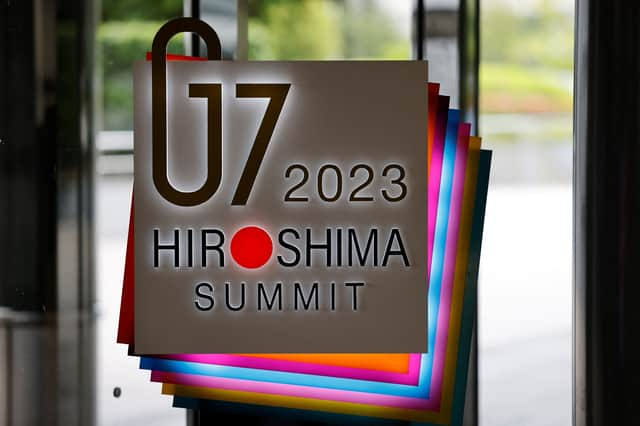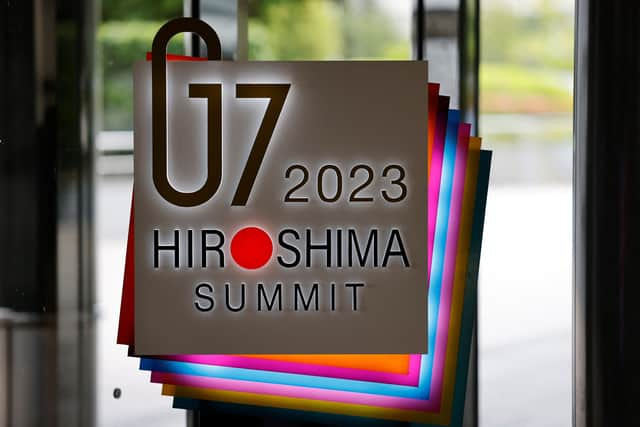G7 summit preview: what world leaders will be talking about in Japan with Ukraine and China on the schedule


World leaders are descending on Japan to take part in the annual G7 summit.
The UK's Rishi Sunak will meet with leaders from the US, Japan, Germany and other countries and organisations as attention turns to the global response to major issues. The summit will run from Friday 19 May until Sunday 21 May.
Advertisement
Hide AdAdvertisement
Hide AdJoining Sunak will be US President Joe Biden, as well as Canadian Prime Minister Justin Trudeau, German Chancellor Olaf Scholz, French President Emmanuel Macron, Italian Prime Minister Giorgia Meloni and European Commission President Ursual von der Leyen. Japan's Fumio Kishida is set to host proceedings.
The summit traditionally meets to discuss the biggest global issues facing the world at that point. This year, there is much to be discussed, with the ongoing war in Ukraine and other threats posed by countries such as China.
Here's everything you need to know about the summit.
Where is the G7 summit being held?
This year’s G7 summit is being held in Hiroshima, Japan at the Grand Prince Hotel Hiroshima. It is the 49th of meeting of its kind between the nations.
The G7 presidency rotates between members of the forum, with the country holding the presidency traditionally hosting the annual summit in their country each year.


Which countries are taking part in the 2023 G7 summit?
Advertisement
Hide AdAdvertisement
Hide AdAll G7 countries are participating in this year’s summit. This list includes Canada, France, Germany, Italy, the United Kingdom, the United States, the European Union (EU) and the host, Japan.
In addition to this, non-G7 countries are invited to participate in discussions, with representatives from each country joining the summit. This year’s invitees include Australia, Brazil, India, Ukraine, the United Nations and the World Health Organisation, among others.
The full list of attendees are:
- UK - Prime Minister Rishi Sunak
- US - President Joe Biden
- Germany - Chancellor Olaf Scholz
- Canada - Prime Minister Justin Trudeau
- Italy - Prime Minister Giorgia Meloni
- France - President Emmanuel Macron
- Japan - Prime Minister Fumio Kishida
- European Union - Commission President Ursula von der Leyen, Council president Charles Michel
- Australia - Prime Minister Anthony Albanese
- Brazil - President Lula
- Comoros - President Azali Assoumani
- Cook Islands - Prime Minister Mark Brown
- India - Prime Minister Narendra Modi
- Indonesia - President Joko Widodo
- South Korea - President Yoon Suk Yeol
- Ukraine - President Volodymyr Zelensky
- Vietnam - Prime Minister Pham Minh Chinh
- United Nations - Secretary-General Antonio Guterres
- World Health Organisation - Director-General Tedros Adhanom Ghebreysus
- World Trade Organisation - Director-General Ngozi Okonjo-Iweala
- Organisation for Economic Cooperation and Development (OECD) - Secretary-General Mathias Cormann
- World Bank - President David Malpass
- International Monetary Fund - Managing Director Kristalina Georgieva
- International Energy Fund - Executive Director Faith Birol
What will be the big talking points of the 2023 G7 summit?
Unsurprisingly, the topics of the Ukraine war and China are likely to dominate discussions at the summit this year. Countries in the G7 have continued to pledge their support for Ukraine after Russia invaded the country almost 15 months ago.
Ukrainian president Volodymyr Zelensky has continued his plea for additional military aid ahead of an expected Ukraine counter-offensive this spring. Discussions may revolve around what additional support the nations can provide to Ukraine, while also discussing the impact of the war on issues such as trade and global supply lines.
Advertisement
Hide AdAdvertisement
Hide AdAdditionally, attention may turn to the response against Russia - a former member when the group was known as G8 - with sanctions already in place. In early discussions on Friday, the forum agreed upon further sanctions to "starve" the Russian "war machine", including restrictions on the export of item "critical to Russia" int he war in Ukraine.
China has become an increasingly contentious subject for the G7 members. Former UK Prime Minister Liz Truss appealed to her successor Rishi Sunak to designate the country a security threat to the UK while on a visit to Taiwan.
The risk of a conflict in Taiwan has been increasing, with China bolstering its military prowess in the East China Sea and Taiwan Strait and running regular military drills on the coast of the island nation.
In addition to this, fears have been raised over China’s influence and power via tech apps such as TikTok. The video sharing app has been banned for use on the mobile devices of government officials in the UK, with the US taking similar measures and the state of Montana issuing a full-on blackout of the app for its residents by 2024.
Advertisement
Hide AdAdvertisement
Hide AdOpinions within the group may clash over China. The country remains a huge source of international trade, and some countries are less inclined to cut ties completely or to sour relations. For example, French President Emmanuel Macron visited Beijing last month and placed emphasis on the EU pulling further away from the US, rather than China.
As reported by Reuters, the matter to be discussed with China is the “economic coercion” the country uses abroad. The conclusion of the G7 summit is expected to produce a joint statement which will have a “section specific to China” but whether a joint stance on the country will be achieved in the three-day event is currently unknown.
Political tensions between some nations in attendance have also been put under the microscope as the leaders meet in Japan. Canadian Prime Minister Justin Trudeau has called out Italian Prime Minister Giorgia Meloni for her country's LGBT+ record in an early meeting at the summit.
The pair butted heads as Trudeau opened the meeting by saying that "Canada is concerned about some of the (positions) that Italy is taking in terms of LGBT rights". Meloni, who recently closed a loophole that allow same-sex couple to be granted legal guardianship of child by municipal mayor, is said to have told her Canadian counterpart that her administration would not be deviating from the previous government's position on the matter.
Comment Guidelines
National World encourages reader discussion on our stories. User feedback, insights and back-and-forth exchanges add a rich layer of context to reporting. Please review our Community Guidelines before commenting.
